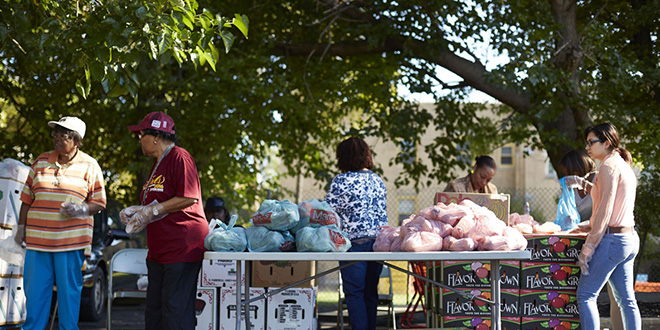05/19/2017
Inspiring Children to be Philanthropic
- Share This Story
Article reprinted with permission from the Cleveland Jewish News.
By Becky Raspe

Adults and teens volunteer at a Hunger Network food drop event.
Philanthropy comes in many shapes and sizes. It can be volunteering time with an organization or donating money to a cause. It can be giving items to those in need.
It’s no secret that adults and established professionals tend to be philanthropic.
Ann Garson, managing director of funds and foundations for the Jewish Federation of Cleveland in Beachwood, and Hunger Network of Greater Cleveland Executive Director Jennifer Scolfield and community outreach volunteer coordinator Delpheena Flowers, all said children can certainly benefit from philanthropic activities as well.
“Early experiences shape children for life,” Garson said. “Engaging in philanthropic activity teaches children compassion and empathy. Giving time, talent and treasure can be part of every child’s life, no matter how young. Children learn that people are here to make the world a better place, not just to consume and acquire material things.”
Garson said the Federation offers many opportunities for children and teens to be involved in philanthropic activities, such as the Saltzman Youth Panel, Super Sunday, high school division of the annual Campaign for Jewish Needs, and many customized experiences across the Jewish community.
“(Children) can also learn that money and time are not just about having for yourself,” Garson said. “Participating in philanthropy can teach how to balance saving, spending and giving as well as the values surrounding the different uses of money. They can learn that giving can be in different forms. We are part of a larger community and everyone has a role to make it better.”
Scolfield said though the Hunger Network doesn’t typically involve young children in its volunteer opportunities, there are definitely ways for them to become involved alongside their families. Especially in the summertime or during school breaks, they see a large increase in families that bring their children and teens along to volunteer.
“It’s important to provide those opportunities as early as we can,” she said. “The earlier you involve them, the more interest is built. Organizations like the Hunger Network are very volunteer driven. If we can find ways to keep the younger generation engaged, they could stay engaged longer.”
Scolfield said volunteering at a young age could help children “open their eyes a little bit to other populations.” Children can get insight into the hardships of others when they surround themselves with the different people who volunteer and the people served at the Hunger Network, she said.
Flowers said there are also organizational and other benefits for children and teens who volunteer at an early age.
“Since things tend to be done in a certain way (at the Hunger Network) when we are preparing,” she said. “There is also a sense of responsibility that comes with regular volunteering.”
Flowers, Garson and Scolfield all said early exposure to philanthropic activities could assist teens and young adults looking to set themselves apart when they apply for college admission.
“To add that piece onto their resume, that would allow (them) to stand out on applications,” Flowers said. “We have college students who come specifically for that reason. They say it really makes a difference being able to put their volunteer activities on there.”
She said many college students tend to go to college not knowing what they want to major in. Volunteering could help them see if civic engagement would be something they are interested in. Volunteer work on a resume can help young adults find a job after a college as well.
Scolfield said extended volunteer work shows commitment.
“Experiences like this can help them make up their mind if they want to do some community support position, like social work or community health,” she said. “I’ve received feedback from students that this has made a world of difference for them, even in terms of how they live and function in their day to day life.”

